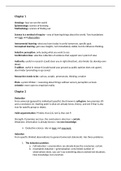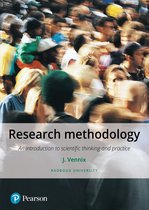Chapter 1
Ontology: how we see the world
Epistemology: science of knowing
Methodology: science of finding out
Science is a method of inquiry > way of learning things about the world. Two foundations
are logic and observation.
Instrumental learning: what you learn today is useful tomorrow, specific goal.
Conceptual learning: gain new insights, not immediately visible, but do influence thinking.
Selective perception: only seeing what you want to see
Confirmation bias: selective collection of evidence that support one’s point of view
Authority: useful in research (could steer you in right direction), also hinder (to develop own
ideas)
Tradition: useful in research (could stand your ground as public opinion does not agree),
also hinder (promoting no-go zones)
Researcher needs to be: curious, sceptic, perseverant, thinking, creative
Plato: a-priori thinker > reasoning about things without sensory perception as basis
Aristotle: more open to empirical reality
Chapter 2
Deduction
From universal (general) to individual (specific). Best known is syllogism: two premises (P)
and a conclusion (c). Starting point is what we already know, theory, and see if that is also
true for specific group or object.
Valid argumentation: P holds, thus Q & not Q, thus not P.
Strength: if premises are true, the conclusion is also true > certain.
Weakness: information is already known > no new knowledge.
Deductive science: rely on logic and argument.
Induction
From specific (limited observations) to general (universal statement). Has three problems:
1. The induction problem:
a. Full induction > enumeration: we already know the conclusion, certain.
b. Incomplete induction > generalization: only limited number of
observations done, you can’t say something about unobserved situations.
New knowledge, but uncertain.
, 2. Open-minded perception: human perception is influenced in all sorts of ways.
3. Misunderstanding that laws or theories appear automatically though induction >
interpretation of observer also important.
Inductive science: rely on observation of empirical phenomena. Looking for
patterns and regularities.
Francis bacon: more systematic inductive method.
Abduction
Creating a hypothesis which may explains an empirical phenomenon (after observation of
empirical generalization). If you have more hypothesis, Ockham’s Razor tells you to always
choose the more simple one > more likely to be correct. Also known as parsimoniousness.
Abduction should always be confirmed through deduction. Leads to new knowledge, not
certain.
To generate new knowledge: induction > abduction > deduction.
Context of discovery: ideas and hypothesis are generated, that can explain certain
phenomena.
Context of justification: justification of certain suspicions we have about phenomena.
Model: simplified representation of certain phenomenon. Implicit > we use in everyday life.
Normative law: what should and what should not be done
Establishing law: one establishes a certain pattern or regularity in observation
Hypothesis: assumption that describes/explains particular phenomenon
Theory: facts and statements ordered in a logical, consistent whole.
Scientific method
1. Observe a pattern (induction)
2. Come up with hypothesis
3. Test these hypotheses systematically
4. Derive test implication from hypothesis through deductive reasoning
Chapter 3
Logical positivism > verification
Every statement must be verifiable by observation. Analytical, normative
(opinion) or metaphysical statements are NOT scientific according to positivists,
since they can not be observed. Synthetic statements: CAN be observed.
Positivism: empirical observation as basis for knowledge. Things are the way they
seem, should be perceptible and unambigious. No research into deep causes,
since they can not be verified empirically.
Inductivism and verification
, Critical rationalism > falsification
Popper: critical of logical positivism, since that works with an inductive method.
And as we know, truth can never be established through induction, because not
all cases can be observed completely. Popper wants to formulate regulatities and
try through observations to reject these hypothesis. When positive, theory can
only be accepted for the time being, cause it can change in the future, when
negative, we declare incorrectly, and we know something for sure.
Deductivism and falsification
Hypothetical-deductive method
Critique on critical rationalism:
- False hypothesis can be due to lots of other things like wrong methodology
- In case of probabilistic statements, hypothesis is only rejected, not falsified.
Demarcation criterion: dividing line between boundaries of science and non-science.
Emperical-analytical research: seek to make general statements and find laws in social
reality.
Nomothetical laws: focus on discovering general scientific laws
Idiographic laws: focus on discovering individual, special, unique laws
Non-empirical concepts > two types
1. Logical/mathematical concept; they originate without an observation
2. Hypothetical concept; assume the existence of something, which itself is not
observable. Example; intelligence, gravity
- Singular, particular, universal statements: one object, all objects, specific objects
- Analytical and synthetic statements: analytical can’t be verified by empirical
observation but by logical structure, synthetic can be verified by empirical
observation.
- Factual and normative statement: normative means opinion, value, judgment, not
able to establish truth from this.
- Static and dynamic statement: particular moment in time vs. change in time,
process.
- Descriptive and explanatory statement: what/how vs. why. Explanatory can be used
to improve or change certain situations.
Deductive-nomological model (D-N): scientific explanation in a deductive structure.
Deductive because of the explanandum (specific) is being deducted from the explanans
(general). Nomological, because at least one of the premises is a law or law-like statement.
Also known as ‘covering law model’ or ‘Hempel Oppenheim scheme’.
Inductive-statistical model (I-S): draw up legality based on inductive principle (from number
of individual cases > general statement). Structure is same as D-N, but with a probabilistic
law, so percentage. The chance of … is 90%, someone has …, the chance of .. for someone is
90%.






